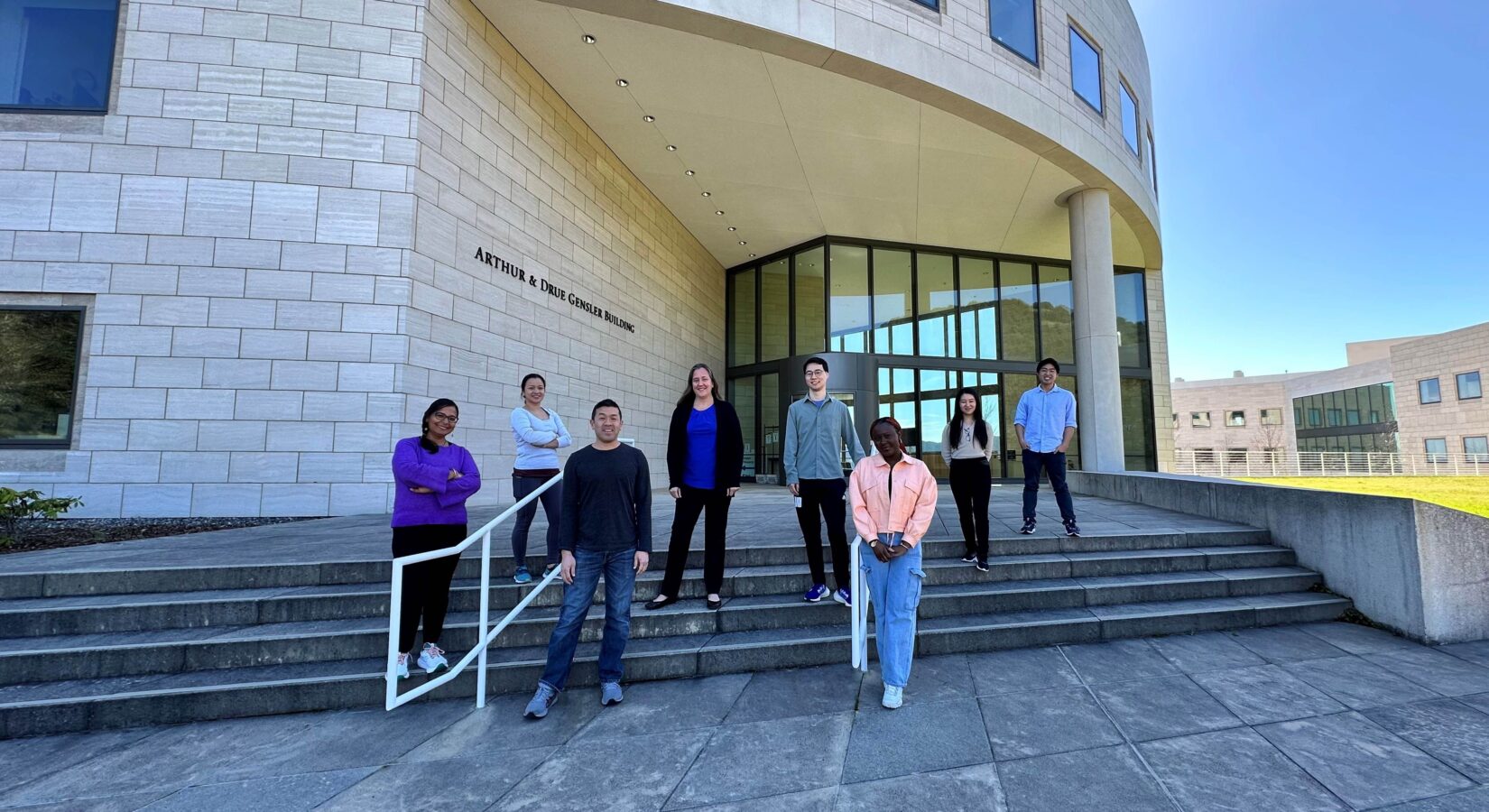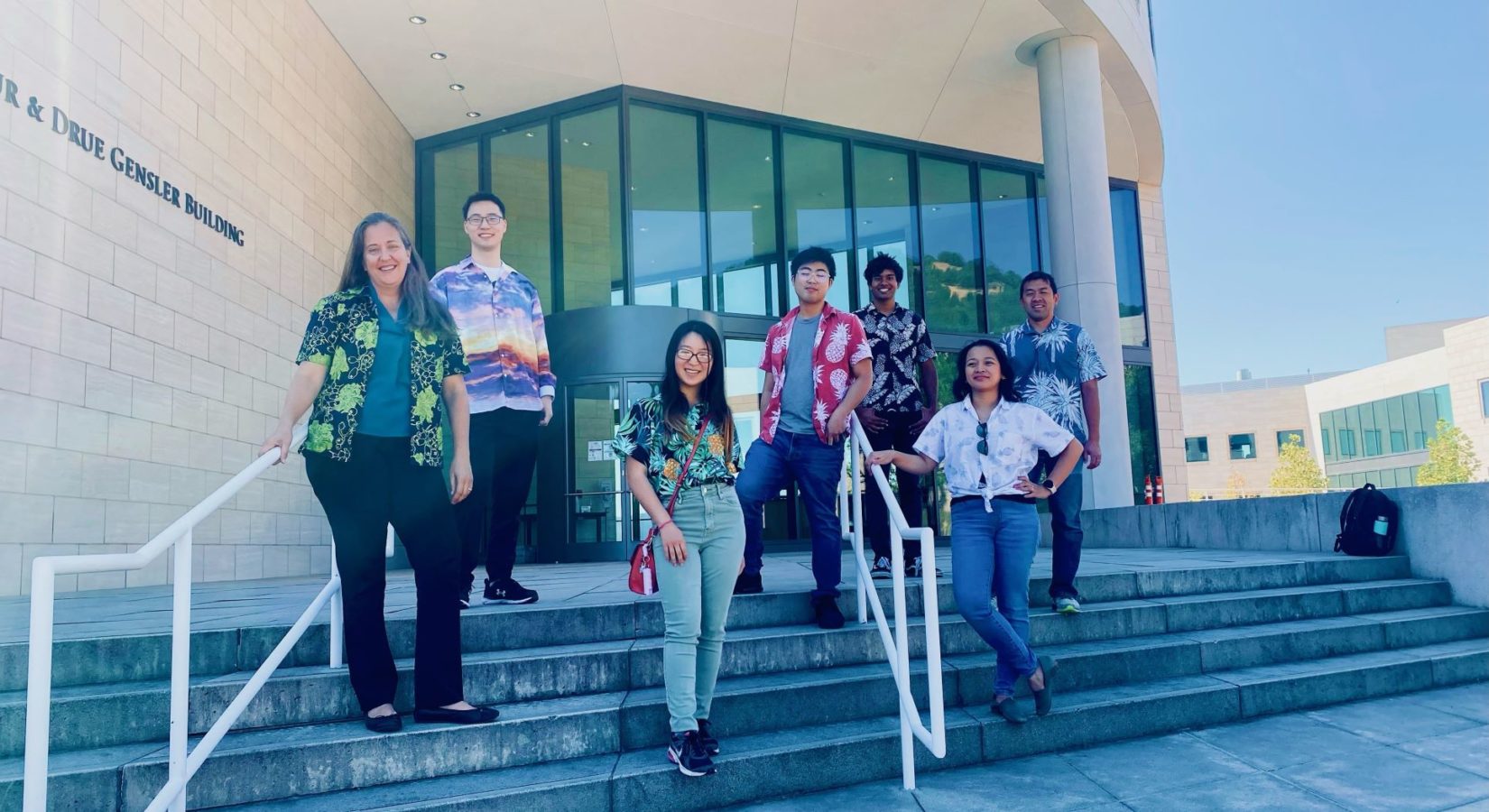TRACY LAB
Lab focus
Synapses are specialized structures that are critical for the transmission of information between neurons in the brain. Fine-tuning of the electrochemical activity at synapses underlies cognitive processes. In Alzheimer’s disease, memory loss coincides with synapse deterioration. The Tracy lab is investigating the molecular events that lead to synapse dysfunction and cognitive decline in Alzheimer’s disease and frontotemporal dementia. We think that synapses are particularly vulnerable to toxicity early in the progression of dementia before neurons begin to die. Tau, a microtubule-associated protein, accumulates in the brain and becomes toxic to neurons in Alzheimer’s disease and frontotemporal dementia. We are exploring how tau-mediated toxicity contributes to the emergence of synapse pathophysiology in these diseases. We are using mouse models and human induced pluripotent stem cell (iPSC)–derived neurons to dissect the mechanisms that trigger synapse and neuronal dysfunction during pathogenesis. Our long-term goal is to establish a foundation for new treatment strategies to restore synapse function and cognition at the early stages of disease progression before neurons are lost.
Why it matters
Millions of people are suffering from progressively debilitating dementia as they age, and the number of people diagnosed with Alzheimer’s disease is steadily rising. To advance our understanding of the mechanisms that promote cognitive decline in Alzheimer’s disease and frontotemporal dementia, it will be critical to discover the events that lead to synapse dysfunction and deterioration. This research may uncover new approaches for therapeutic intervention early in disease progression to promote the healthy aging of the brain.
It’s becoming obvious that intervening early in the disease process is essential in order to promote healthy aging of the brain. My lab is focused on discovering the early events that lead to neurodegeneration.
Tara Tracy, PhD
CENTER DETAILS
Dr. Tracy has expertise in synapse biology and in research on Alzheimer’s disease and related dementias. After graduating from Wesleyan University, she received her PhD in neuroscience from the University of California, Berkeley where she studied synapse development. During her postdoctoral training at the Gladstone Institute of Neurological Disease and the University of California, San Francisco, Dr. Tracy investigated the toxic mechanisms that drive neuron dysfunction and cognitive decline in Alzheimer’s disease. Dr. Tracy joined the Buck Institute faculty in 2018. Her laboratory is investigating how synapses are altered in the brain leading to cognitive decline in aging and in neurodegenerative diseases. The research in Dr. Tracy’s laboratory has been funded by the National Institute on Aging (K01, R01, R03), and Dr. Tracy’s work has also been supported by grants from the Alzheimer’s Association, Forever Healthy, and the BrightFocus Foundation. Dr. Tracy has received awards in recognition of her work from the Alzheimer’s Association and the Society for Neuroscience. In 2022, Dr. Tracy was awarded the McKnight Brain Research Foundation Innovator Award in Cognitive Aging & Memory Loss from AFAR (the American Federation of Aging Research).
-
 Grant Kauwe, PhD Staff Scientist
Grant Kauwe, PhD Staff ScientistDr. Kauwe received his undergraduate degree in biology at the University of Hawaii at Manoa and his PhD in neuroscience at the University of California, Berkeley. He received postdoctoral training at the Buck Institute, where he focused on how diet regulates neuronal function. In the Tracy lab, he is investigating the dysregulation of plasticity at synapses underlying memory loss in neurodegenerative disease.
GKauwe@buckinstitute.org
-
 Doyle Lokitiyakul PhD Candidate, USC-Buck Biology of Aging Program
Doyle Lokitiyakul PhD Candidate, USC-Buck Biology of Aging ProgramDoyle received his undergraduate BA degree in biology from Washington University in St. Louis. Currently, he is a graduate student from the University of Southern California-Buck Biology of Aging Ph.D. program, joining the Tracy lab in August 2021. As an undergrad, his main focus was on NAD+ and its regulatory effects on the aging process. During his undergraduate project, he participated in a CRISPR Cas9 screen, aiming to determine which protein was responsible for a sudden decrease in NAD levels within macrophages during inflammation: a phenomenon that is hypothesized to contribute to age related inflammation. Currently, as a member of the Tracy lab, he is interested in studying translational regulation in the synapses and how it affects neuronal plasticity. During his free time Doyle enjoys reading long science fiction/epic fantasy novels and practicing Muay Thai.
DLokitiyakul@buckinstitute.org
-
 Yani Ngwala Research Associate
Yani Ngwala Research Associateyngwala@buckinstitute.org
-
 Kristeen Pareja, PhD Research Scientist
Kristeen Pareja, PhD Research ScientistDr. Pareja-Navarro is originally from Los Baños Laguna, Philippines. She earned her BS Degree in Biochemistry and Molecular Biology from UC Davis and her PhD in Pharmacology from Cornell University. Prior to attending graduate school, she worked in several labs including Lawrence Berkeley National Laboratory, Novozymes and Touro University. As a graduate student in the Sevier lab, she studied chaperone proteins involved in oxidative stress signaling. She joined the Tracy lab in December 2019 where she is currently investigating the role of tau oligomers in synapse dysfunction.
KPareja@buckinstitute.org
-
 Mahima Sharma Postdoctoral Researcher
Mahima Sharma Postdoctoral ResearcherDr. Sharma received her undergraduate degree in biotechnology and chemistry from the University of Jammu, India and her master's in biomedical sciences from ACBR, University of Delhi, India. She earned her PhD in Neuroscience at the National University of Singapore (NUS). She received postdoctoral training at the City College of New York, where she focused on how electric current stimulation affects the brain and the spinal cord. In the Tracy lab, she is currently investigating the dysregulation of postsynaptic function underlying memory loss in neurodegenerative disease.
msharma@buckinstitute.org
-
 Ivy Wong Research Associate
Ivy Wong Research AssociateIvy earned her BA in neuroscience at the University of Pennsylvania. Prior to joining the Buck Institute, she worked as a research associate in labs at the Chinese University of Hong Kong, University of Pennsylvania, and UC Davis. At the Tracy lab, she is providing technical support for research on synapse and neuronal dysfunction underlying memory deficits in age-related dementias.
IWong@buckinstitute.org
-
 Lei Yao, PhD Postdoctoral Research Fellow
Lei Yao, PhD Postdoctoral Research FellowDr. Lei Yao received his BA degree in biology and his Ph.D. in neuroscience from University of Science and Technology of China (USTC). Prior to join the Buck Institute, he worked as a postdoctoral researcher in USTC studying the neuro-circuits bases underlying emotional control. At the Tracy lab, he is currently investigating the therapeutic method to treat neurodegenerative disease.
LYao@buckinstitute.org
LAB GALLERY
Selected Publications
-
Kauwe G#, Pareja-Navarro KA#, Yao L, Chen J, Wong I, Saloner R, Cifuentes H, Nana AL, Shah S, Li Y, Le D, Spina S, Grinberg LT, Seeley WW, Kramer JH, Sacktor TC, Schilling B, Gan L, Casaletto KB, Tracy TE. (2023). KIBRA repairs synaptic plasticity and promotes resilience to tauopathy-related memory loss. Journal of Clinical Investigation. 134, (3): e169064. PMCID: PMC10312627 (*Co-first author)
- Tracy TE*#, Madero-Perez J*#, Swaney D*#, Chang TS, Moritz M, Konrad C, Ward ME, Stevenson, E Huttenhain R, Kauwe G, Mercedes M, Sweetland-Martin L, Chen X, Mok SA, Telpoukhovskaia M, Min SW, Wang C, Sohn PD, Martin J, Zhou Y, Manfredi G, Coppola G, Krogan N, Geschwind D, Gan L# (2022). Tau interactome maps synaptic and mitochondrial processes associated with neurodegeneration. Cell. 185, 712-728. (*Co-first author, #Co-corresponding author)
-
Kauwe G, Tracy TE (2021). Amyloid-β emerges from below the neck to disable the brain. PLOS Biology. 19 (9):e3001388. doi: 10.1371/journal.pbio.3001388
-
Shin MK, Vazquez-Rosa E, Koh Y, Dhar M, Chaubey K, Clintron-Perez CJ, Barker S, Miller E, Franke K, Noteman MF, Seth D, Allen R, Motz CT, Rao SR, Skelton LA, Pardue MT, Fliesler SJ, Wang C, Tracy TE, Gan L, Liebl DJ, Savarraj JPJ, Torres GL, Ahnstedt H, McCullough LD, Kitagawa RS, Choi HA, Zhang P, Hou Y, Chiang CW, Li L, Ortiz F, Kilgore JA, Williams NS, Whitehair VC, Gefen T, Flanagan ME, Stamler JS, Jain, MK, Kraus A, Cheng F, Reynolds JD, Pieper AA (2021). Reducing acetylated tau is neuroprotective in brain injury. Cell. 184, 2715-2732.
-
Limbad C, Oron TR, Alimirah F, Davalos AR, Tracy TE, Gan L, Desprez PY, Campisi J (2020). Astrocyte senescence promotes glutamate toxicity in cortical neurons. PLoS One. 15 (1):e0227887.
-
Sohn PD, Huang CT, Yan R, Fan L, Tracy TE, Camargo CM, Montgomery K, Arhar T, Mok SA, Freilich R, Baik J, He M, Gong S, Roberson ED, Karch CM, Gestwicki JE, Xu K, Kosik KS, Gan L (2019). Pathogenic Tau Impairs Axon Initial Segment Plasticity and Excitability Homeostasis. Neuron, 104, 458-70
- Tracy, T. E., Gan, L. (2018). Tau-mediated synaptic and neuronal dysfunction in neurodegenerative disease. Current Opinion of Neurobiology, 51, 134–138.
- Martinez-Losa, M. M.*, Tracy, T. E.*, Ma, K.*, Khan, A., Verret, L., Clemente, A., Cobos, I., Ho, K., Gan, L., Mucke, L., Alvarez-Dolado, M., Palop, J. J. (2018). Nav1.1-overexpressing interneuron transplants restore brain rhythms and cognition in a mouse model of Alzheimer’s disease. Neuron, 98, 75–89.
- Wang, C., Ward, M., Chen, R., Liu, K., Tracy, T. E., Chen, X., Xie, M., Sohn, P. D., Ludwig, C., Meyer-Franke, A., Ding, S., Gan, L. (2017). Scalable production of iPSC-derived human neurons to identify novel tau-lowering compounds by high-content screening. Stem Cell Reports, 9, 1221–1233.
- Tracy, T. E., Gan, L. (2017). Acetylated tau in Alzheimer’s disease: An instigator of the synaptic dysfunction underlying memory loss. BioEssays, 39, 4.
- Sohn, P. D.*, Tracy, T. E.*, Son, H. I., Zhou, Y., Leite, R., Miller, B., Seeley, W. W., Grinberg, L., Gan, L. (2016). Acetylated tau destabilizes the cytoskeleton in the axon initial segment and is mislocalized to the somatodendritic compartment. Molecular Neurodegeneration, 11, 47.
- Tracy, T. E., Sohn, P. D., Minami, S. S., Wang, C., Min, S. W., Zhou, Y., Li, Y., Le, D., Lo, I., Ponnusamy, R., Cong, X., Schilling, B., Ellerby, L., Huganir, R. L., Gan, L. (2016). Acetylated tau obstructs KIBRA-mediated signaling in synaptic plasticity and promotes tauopathy-related memory loss. Neuron, 90, 245–60.
(*Equal contributions)










